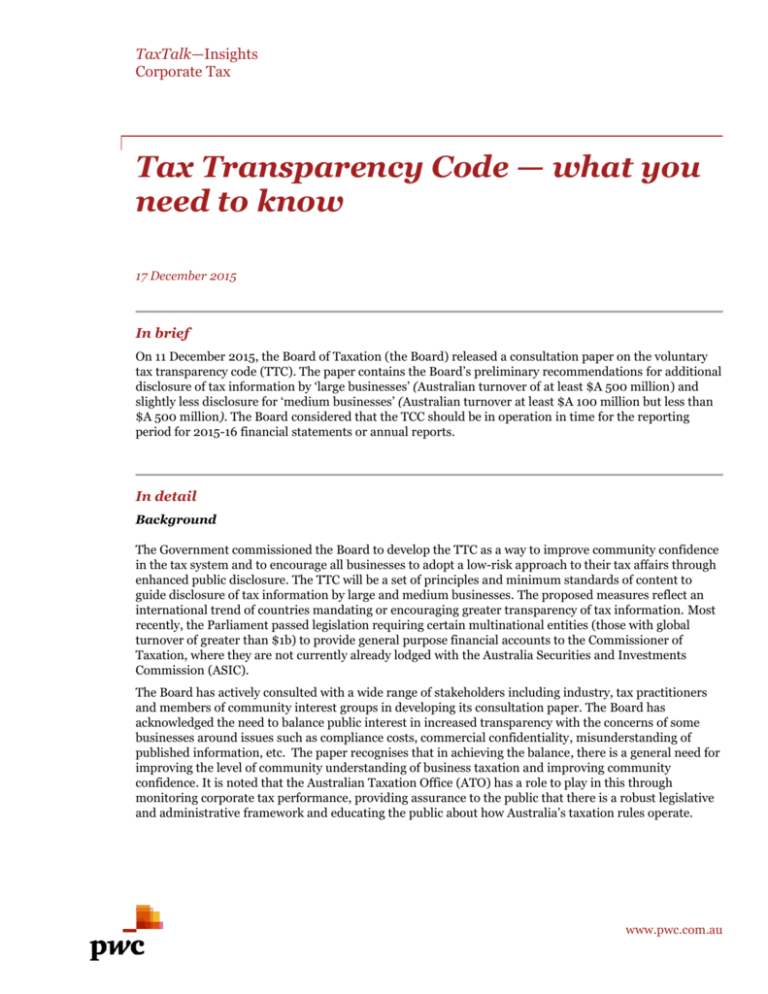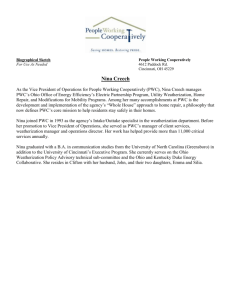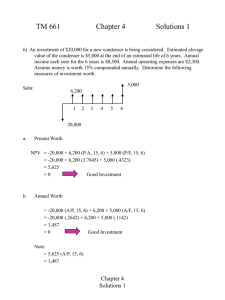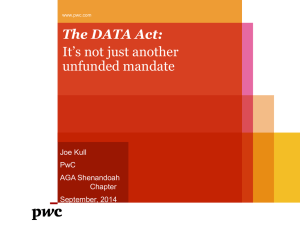
TaxTalk—Insights
Corporate Tax
Tax Transparency Code — what you
need to know
17 December 2015
In brief
On 11 December 2015, the Board of Taxation (the Board) released a consultation paper on the voluntary
tax transparency code (TTC). The paper contains the Board’s preliminary recommendations for additional
disclosure of tax information by ‘large businesses’ (Australian turnover of at least $A 500 million) and
slightly less disclosure for ‘medium businesses’ (Australian turnover at least $A 100 million but less than
$A 500 million). The Board considered that the TCC should be in operation in time for the reporting
period for 2015-16 financial statements or annual reports.
In detail
Background
The Government commissioned the Board to develop the TTC as a way to improve community confidence
in the tax system and to encourage all businesses to adopt a low-risk approach to their tax affairs through
enhanced public disclosure. The TTC will be a set of principles and minimum standards of content to
guide disclosure of tax information by large and medium businesses. The proposed measures reflect an
international trend of countries mandating or encouraging greater transparency of tax information. Most
recently, the Parliament passed legislation requiring certain multinational entities (those with global
turnover of greater than $1b) to provide general purpose financial accounts to the Commissioner of
Taxation, where they are not currently already lodged with the Australia Securities and Investments
Commission (ASIC).
The Board has actively consulted with a wide range of stakeholders including industry, tax practitioners
and members of community interest groups in developing its consultation paper. The Board has
acknowledged the need to balance public interest in increased transparency with the concerns of some
businesses around issues such as compliance costs, commercial confidentiality, misunderstanding of
published information, etc. The paper recognises that in achieving the balance, there is a general need for
improving the level of community understanding of business taxation and improving community
confidence. It is noted that the Australian Taxation Office (ATO) has a role to play in this through
monitoring corporate tax performance, providing assurance to the public that there is a robust legislative
and administrative framework and educating the public about how Australia’s taxation rules operate.
www.pwc.com.au
In designing the framework for the TTC, the Board identified three categories of potential users of the
information. They are;
1. General users — the ‘person in the street’
2. Interested users — shareholders, analysts, investors, social justice groups, media and politicians,
and
3. Revenue and regulatory authorities — the ATO and ASIC.
The TTC has been explicitly designed for the first two categories of users, recognising that the ATO
already has access to all of the information it needs through tax returns, supporting schedules and
information it obtains directly from businesses.
The Board is requesting submissions on the proposals set out in the consultation paper by 29 January
2016.
Will it affect you?
In developing the TTC the Board has created different recommendations for different categories of
business.
Large businesses
Medium businesses
Companies and groups operating in Australia (Australianheadquartered and foreign multinationals) with aggregated
Australian turnover of at least $A 5oo million.
Companies and groups operating in Australia (Australianheadquartered and foreign multinationals) with aggregated
Australian turnover of at least $A 1oo million but less than $A
500 million.
Companies below the above thresholds will not be expected to adopt with the TTC. It is expected that the
TTC will generally not be adopted by partnerships, trusts and superannuation funds unless they feel the
need to do so.
What will need to be disclosed under the TTC?
As noted above, the recommended TTC disclosures will differ depending on the category of the business.
The Board’s preliminary recommendation is that:
Medium businesses should adopt Part A, which involves improvements to tax disclosures in
financial statements (Part A), and
Large businesses should adopt Part A and also Part B which is the preparation of an annual ‘taxes
paid’ report.
The recommendations in Part A and Part B are summarised below.
Part A — entails the following
disclosures:
1. A reconciliation of accounting profit to tax expense and to
income tax paid or income tax payable.
A reconciliation at a global level is acceptable.
Where Australian general purpose accounts are not
prepared, disclosure should be made in the ‘taxes paid’
report or another document (explained further below).
2. Identification of material temporary and non-temporary
differences.
PwC
Page 2
3. Accounting effective company tax rates (ETRs) for
Australian and global operations.
1. Qualitative description of the approach to tax policy, tax
strategy and governance.
Overview of internal governance and controls in
relation to taxation, approach and attitude towards tax
risk management, tax planning and relationship with
the ATO and other tax authorities.
Disclosure of disputes with the ATO/other revenue
authorities is not recommended.
Part B — entails the following
disclosures:
2. Total tax contribution summary of corporate taxes paid.
Core element: Disclosure of corporate income tax.
Optional element: Disclosure of other taxes and
imposts paid e.g. Petroleum Resources Rent Tax,
royalties, excises, payroll taxes, stamp duties, fringe
benefits tax and state taxes.
Optional element: Disclosure of Government imposts
collected by the business on behalf of others e.g. GST
and PAYG withholding
3. Qualitative information about international related party
dealings, financing and tax concessions.
This would include a qualitative explanation of the
nature of related party dealings and measures that
have been put in place to manage tax risks.
The Board has concluded that quantitative information
raises issues of commercial sensitivity and may not be
meaningful to intended users.
How should the disclosures be made?
The Board recommends that companies that prepare Australian general purpose accounts include the
Part A disclosures as part of those accounts. Businesses that do not prepare general purpose accounts
would be expected to include the Part A disclosures in a separate document.
The ‘taxes paid’ report is separate from the financial statements and is expected to be made public. The
Board does not intend to prescribe a standard template or form for the report. It is anticipated that many
businesses will publish more than the minimum standard of content for the TTC due to their corporate
approach to transparency, international transparency requirements or because their particular
circumstances warrant further explanation.
The Board also recommends that a ‘responsible agency’ (possibly the ATO or another government agency)
be appointed for the purpose of administration of the TTC. Businesses would be expected to notify the
‘responsible agency’ when the report is published on the website.
There is no proposed requirement for the disclosures to be audited, other than those that are made
through the financial statements which are already subject to audit requirements. It is expected that
PwC
Page 3
businesses will already obtain significant assurance on much of the content through external and internal
audit processes.
Further, it is not proposed that there be further oversight or that penalties be imposed for misleading
disclosure. The Board expects that senior management will sign off the disclosures and the reputational
impact of being found to make misleading statements will be sufficient.
There is no proposed timeframe for the preparation of the ‘taxes paid’ report, but it is recommended to
apply from the FY 2015/16 reporting period.
What does not need to be disclosed?
The Board has clearly considered carefully a number of proposals from various stakeholders in terms of
possible items that could be disclosed publicly as part of the TTC. In developing its proposal, it has
considered and rejected the following;
The new OECD Country by Country report which is intended for tax authorities and is not
designed for public disclosure;
Requiring foreign companies that make sales or supplies to Australian customers and are not
subject to Australian corporate tax, to disclose sales to Australian customers. It was noted that
recently enacted legislation (the so-called Multinational Anti-Avoidance Law) will create an
incentive for relevant foreign multinationals to restructure their business and create a taxable
presence in Australia. This will in turn, bring them within the scope of the TTC.
Publishing ETRs calculated using the ATO’s Effective Tax Borne methodology as it is considered
too complex and not suitable for public disclosure under the TTC.
The takeaway
The Board has taken a carefully considered and balanced approach to a highly sensitive topic. In doing so,
the Board has consulted widely and had to balance many competing views and proposals.
The proposed TTC may potentially apply to a wide range of Australian-parented companies and
multinationals with operations in Australia. The proposed approach has taken care to set the minimum
standards at a level that seeks to best preserve commercially confidential information and limit
compliance costs, while at the same time, make a meaningful contribution to demands for greater tax
transparency in Australia. There is flexibility for companies to disclose more, should they choose to do so,
and there is an emphasis on providing qualitative explanations over raw numbers.
Written submissions in relation to the consultation paper are due by 29 January 2016, with the Board due
to release its final report due by May 2016.
PwC
Page 4
TaxTalk—Insights
Corporate Tax
Let’s talk
For a deeper discussion about transparency and stakeholder trust, please contact:
Michael Bersten,
Partner, Sydney
+61 (2) 8266 6858
michael.bersten@au.pwc.com
Rob Hines,
Partner, Sydney
+61 (2) 8266 0281
robert.hines@au.pwc.com
Nick Houseman,
Partner, Sydney
+61 (2) 8266 4647
nick.p.houseman@au.pwc.com
Derek Ivers,
Partner, Sydney
+61 (2) 8266 8451
derek.ivers@au.pwc.com
Gavin Marjoram,
Partner, Sydney
+61 (2) 8266 0576
gavin.marjoram@au.pwc.com
Judy Sullivan,
Partner, Sydney
+61 (2) 8266 0197
judy.sullivan@au.pwc.com
Ronen Vexler,
Partner, Sydney
+61 (2) 8266 0320
ronen.vexler@au.pwc.com
Ashley King,
Partner, Melbourne
+61 (3) 8603 1363
ashley.king@au.pwc.com
Julian Myers,
Partner, Brisbane
+61 (7) 3257 8711
julian.myers@au.pwc.com
Julian Myers,
Partner, Brisbane
+61 (7) 3257 8711
julian.myers@au.pwc.com
© 2015 PricewaterhouseCoopers. All rights reserved. In this document, “PwC” refers to PricewaterhouseCoopers a partnership formed in
Australia, which is a member firm of PricewaterhouseCoopers International Limited, each member firm of which is a separate legal entity. This
publication is a general summary. It is not legal or tax advice. Readers should not act on the basis of this publication before obtaining
professional advice. PricewaterhouseCoopers is not licensed to provide financial product advice under the Corporations Act 2001 (Cth).
Taxation is only one of the matters that you need to consider when making a decision on a financial product. You should consider taking advice
www.pwc.com.au
from the holder of an Australian Financial Services License before making a decision on a financial product.
Liability limited by a scheme approved under Professional Standards Legislation.








